New service helps stroke survivors with recovery
Stroke survivors across NSW now have access to support when they leave hospital with the launch of the Stroke Foundation Follow Up service

Stroke survivors across New South Wales now have access to support when they leave hospital with the launch of the Stroke Foundation Follow Up service.
Stroke is one of Australia's biggest killers and a leading cause of disability, with more than 50,000 new and recurrent strokes occurring nationwide every year. To help fast track patient recovery and reduce hospital re-admission rates, the Stroke Foundation has implemented the new Follow Up service to assist stroke survivors as they return home from hospital.
The nib foundation funded Follow Up service is currently on offer at 17 sites across regional and metropolitan areas of the state, including a combination of both public and private facilities. The program provides patients with a call from a health professional after hospital discharge and as well as with information, advice, support and referrals to assist them to better manage their health and stroke recovery.
Stroke Foundation NSW Executive Officer, Teresa Howarth, said the service provides access to enhanced care and support to promote recovery for stroke survivors, their carers and family.
"During 2015 alone, NSW residents experienced more than 17,000 strokes. It is a sudden and potentially devastating health crisis that strikes without warning, leaving people no time to prepare," Ms Howarth said.
"The Follow Up program fills an existing service gap for stroke survivors and those heavily involved in their recovery by providing much needed support and advice on their return to home, which for some is described as the most challenging phase of their life journey," she said.
Since its recent launch, more than 100 patients have been referred to the service with plans to reach a total of 1,500 participants over the next 12 months.
Lily*, a carer for her 70-year-old mother who suffered a stroke in May this year, was one of the first people to access the Follow Up service and said it has significantly helped her mother's recovery.
"I noticed a number of changes in mum after her stroke, but significantly she'd gone from being a very social person to avoiding social contact and losing her self-confidence. She had moments where she felt scared and admitted to having bad thoughts," she said.
"The service provided me with information regarding depression and anxiety after stroke to help me support mum through her recovery. Having a dedicated StrokeConnect officer on hand to answer my questions and offer much needed advice gave me confidence and put my mind at ease that I was there for mum when she needed me most," she added.
nib foundation Chairman, Keith Lynch, said the Follow Up service is a crucial second phase of stroke survivor support that builds upon the success of the My Stroke Journey patient resource.
"This support service complements the education resource by better equipping stroke survivors and their carers with the tools and knowledge to ensure they are able to manage ongoing issues and disabilities, as well as helping reduce their risk of having another stroke," Mr Lynch said.
All stroke survivors and carers over the age of 18 years are eligible for the service and the Stroke Foundation works with participating hospitals to confirm patient referrals as part of the hospital's preparing for discharge process. To find out more visit the Stroke Foundation website.
*de-identified for privacy reasons
Have a media enquiry?
If you have a media query, get in touch today.